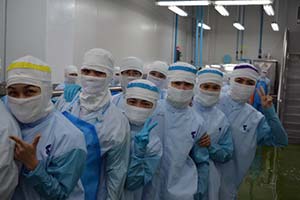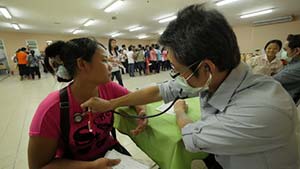Thai Union has employed more than 1,000 people at its Samut Sakhon factory who had previously worked at off-site shrimp peeling sheds operated by third parties. The move was made to enable the Bangkok-headquartered company to have direct oversight of all production stages.
“We are extremely pleased to be able to offer safe and legal employment to former workers from the external pre-processing facilities. Ensuring transparency, traceability of our supply chain and upholding the rights of our employees is of paramount importance, and I am confident that by working in-house at our processing facilities these workers’ rights will be guaranteed,” said Rittirong Boonmechote, president of the company’s global shrimp business unit.
 New employees at Thai Union, registered with legal work permits and wearing full uniforms, are ready to start work in the shrimp processing plant at Samut Sakhon.His statement, made on January 18, came as a five-day inspection tour of Thai seafood processing plants by European Union representatives was about to begin. Last April the EU issued a so-called “yellow card” warning over concern that fish caught illegally from unreported and unregulated (IUU) waters has entered the Thai processing sector. Abuse of workers’ rights was also regarded as a serious concern, and Thailand, the world’s No. 3 exporter of seafood products, stands to lose access to much of the European market if these issues are not resolved to the EU’s liking.
New employees at Thai Union, registered with legal work permits and wearing full uniforms, are ready to start work in the shrimp processing plant at Samut Sakhon.His statement, made on January 18, came as a five-day inspection tour of Thai seafood processing plants by European Union representatives was about to begin. Last April the EU issued a so-called “yellow card” warning over concern that fish caught illegally from unreported and unregulated (IUU) waters has entered the Thai processing sector. Abuse of workers’ rights was also regarded as a serious concern, and Thailand, the world’s No. 3 exporter of seafood products, stands to lose access to much of the European market if these issues are not resolved to the EU’s liking.
According to Prawit Wongsuwan, Thailand’s deputy prime minister, new laws have been introduced that should prevent the EU from imposing a trade ban.
“There has been huge progress, because we have solved many problems in terms of the law, and its application,” he commented. “Whether they are satisfied or not we will have to see; we’ve done our utmost.”
While most shrimp processed in Thailand for export markets comes from land-based farms rather than the sea, fish meal made from IUU-sourced raw material may have been utilized as shrimp feed in the past. Furthermore, a widely distributed investigative report by the Associated Press late last year claimed that child labor abuse and forced labor was taking place in the shrimp supply chain, specifically at peeling and heading “sheds.” A shed refers to a seasonal, temporary processing plant that operates independently and may be unregistered and unlicensed.
 An employee receives a health checkup, which is required for all persons to receive a Thai work permit.Thai Union’s 1,000-plus new employees have been fully registered for work permits with the Royal Thai Government. They are being paid wages consistent with rates earned by processing line employees, which meets minimum wage requirements under Thai law. The workers have been provided with all apparel and equipment, as required by Thai Union health and safety standards. They have also attended an induction workshop to learn about employment rights under national law, as well as the company’s employment rules and regulations.
An employee receives a health checkup, which is required for all persons to receive a Thai work permit.Thai Union’s 1,000-plus new employees have been fully registered for work permits with the Royal Thai Government. They are being paid wages consistent with rates earned by processing line employees, which meets minimum wage requirements under Thai law. The workers have been provided with all apparel and equipment, as required by Thai Union health and safety standards. They have also attended an induction workshop to learn about employment rights under national law, as well as the company’s employment rules and regulations.
Additionally, Thai Union has given financial support to those workers who were out of jobs since the company ceased business with external pre-processors. During this transition period, the pre-processing employees were paid their minimum wage to ensure that they were not struggling as a result of factors beyond their control. Thai Union also provides free transportation for employees from their places of residence to the factories to help with the transition to their new working arrangements.
Higher Shrimp Production Anticipated
Meanwhile, now that the early mortality syndrome (EMS) disease problem at shrimp farms is subsiding, the company expects to see exports of shellfish grow by up to 15% in value during 2016 over last year’s turnover of 42 billion baht. Capacity is forecast to rise from 250,000 tons in 2015 to between 270,000 and 300,000 tons this year.
“We missed the chance to grow last year due to the EMS outbreak, which cut shrimp supply substantially,” said President Rittirong.
Farm-raised shrimp, overwhelmingly exported in frozen form, accounts for approximately 27% of the Thai Union Group’s revenues, compared to more than 50% earned from canned tuna. Sales of all products during the first three quarters of 2015 amounted to 93 billion baht. Total sales for all four quarters in 2014 reached 122 billion baht.





